agree的用法
agree的用法及解释

agree的用法及解释对于agree的用法,常常被很多人忽略,其实对初学者来说,agree是一个常见的词汇,它的用法有很多,那么你了解多少呢?下面是小编给大家带来的agree的用法及解释_agree的六个用法总结,以供大家参考,我们一起来看看吧!agree的解释v. 同意; 赞成; (对…) 取得一致意见,一致同意; 应允; 答应;[例句]If we agreed all the time it would be a bit boring, wouldn't it?如果我们总是意见一致,就会有点无趣,对吗?[其他] 第三人称单数:agrees 现在分词:agreeing 过去式:agreed 过去分词:agreedagree to,agree with,agree on,agree about的用法区别.1.agree (to sth) 意为“同意;愿意;答应(某事物)”.如:Is he going to agree to our suggestion?他会同意我们的建议吗?2.agree with sb 意为“适合(某人的健康或胃口)”,尤用于否定句或疑问句中.如:The climate there doesn\'t agree with him.那里的气候对他不合适.3.agree (with sb) (about / on sth) 意为“同意;(与某人)意见一致”.如:We couldn\'t agree on a date/ when to meet.关于日期(什么时候见面),我们没有能取得一致意见.4.agree sth意为“在某事物上取得一致意见;商定”.如:Can we agree a price?我们能不能商定一个价格?5.agree (with sth) 意为“与(某事物)相一致;相符合;相吻合”.如:Your thoughts didn\'t agree with mine.你的想法和我的想法不一致.6.be agreed(on /about sth)意为“达成协议;意见一致”.如:We are all agreed on the best action.我们都同意这一最佳措施.7.agree后面还可以接宾语从句,即be agreed that ...如:It was agreed that another meeting was necessary.大家都认为有必要再开一次会.agree的六个用法agree一般与with连用,agree with sb.,表示同意某人的观点agree vt. & vi. 基本用法如下1)单独使用,表示同意、答应等。
agree的用法与练习

⽆忧考英语资源频道为⼤家整理的agree的⽤法与练习,供⼤家阅读参考。
agree是⼀个使⽤范围很⼴的单词,意为“同意;赞同”。
它有很多相关词组,现在把其主要⽤法归纳如下:1. agree (to sth) 意为“同意;愿意;答应(某事物)”。
如:Is he going to agree to our suggestion? 他会同意我们的建议吗?2. agree with sb 意为“适合(某⼈的健康或胃⼝)”,尤⽤于否定句或疑问句中。
如:The climate there doesn't agree with him.那⾥的⽓候对他不合适。
3. agree (with sb) (about / on sth) 意为“同意;(与某⼈)意见⼀致”。
如:We couldn't agree on a date/ when to meet. 关于⽇期(什么时候见⾯),我们没有能取得⼀致意见。
4. agree sth意为“在某事物上取得⼀致意见;商定”。
如:Can we agree a price? 我们能不能商定⼀个价格?5. agree (with sth) 意为“与(某事物)相⼀致;相符合;相吻合”。
如:Your thoughts didn't agree with mine. 你的想法和我的想法不⼀致。
6. be agreed(on /about sth)意为“达成协议;意见⼀致”。
如:We are all agreed on the best action. 我们都同意这⼀措施。
7. agree后⾯还可以接宾语从句,即be agreed that ...如:It was agreed that another meeting was necessary. ⼤家都认为有必要再开⼀次会。
agree的用法有哪些agree的固定短语搭配
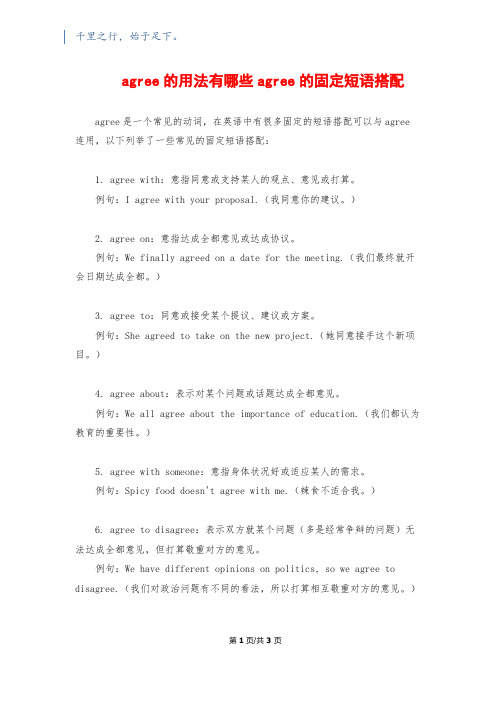
千里之行,始于足下。
agree的用法有哪些agree的固定短语搭配agree是一个常见的动词,在英语中有很多固定的短语搭配可以与agree 连用,以下列举了一些常见的固定短语搭配:1. agree with:意指同意或支持某人的观点、意见或打算。
例句:I agree with your proposal.(我同意你的建议。
)2. agree on:意指达成全都意见或达成协议。
例句:We finally agreed on a date for the meeting.(我们最终就开会日期达成全都。
)3. agree to:同意或接受某个提议、建议或方案。
例句:She agreed to take on the new project.(她同意接手这个新项目。
)4. agree about:表示对某个问题或话题达成全都意见。
例句:We all agree about the importance of education.(我们都认为教育的重要性。
)5. agree with someone:意指身体状况好或适应某人的需求。
例句:Spicy food doesn't agree with me.(辣食不适合我。
)6. agree to disagree:表示双方就某个问题(多是经常争辩的问题)无法达成全都意见,但打算敬重对方的意见。
例句:We have different opinions on politics, so we agree to disagree.(我们对政治问题有不同的看法,所以打算相互敬重对方的意见。
)第1页/共3页锲而不舍,金石可镂。
7. agree in principle:表示在原则上同意某个提议或建议,但细节问题需要进一步争辩和协商。
例句:I agree in principle, but we need to work out the details.(我原则上同意,但我们需要争辩和解决细节问题。
agree的用法
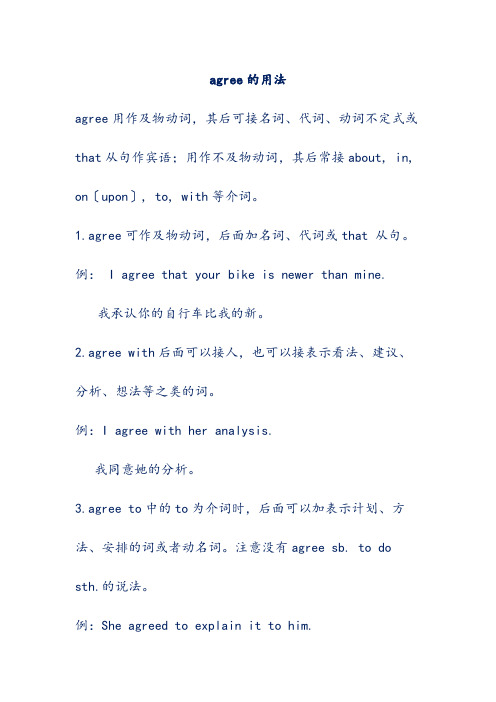
agree的用法agree用作及物动词,其后可接名词、代词、动词不定式或that从句作宾语;用作不及物动词,其后常接about, in, on 〔upon〕, to, with等介词。
1.agree可作及物动词,后面加名词、代词或that 从句。
例: I agree that your bike is newer than mine.我承认你的自行车比我的新。
2.agree with后面可以接人,也可以接表示看法、建议、分析、想法等之类的词。
例:I agree with her analysis.我同意她的分析。
3.agree to中的to为介词时,后面可以加表示计划、方法、安排的词或者动名词。
注意没有agree sb. to do sth.的说法。
例:She agreed to explain it to him.她同意向他解释这件事。
4.agree on常接价格、协议、条款等词。
例:We didn’t sign on the contract because we didn’t agree on the price.我们没有在合同上签字,因为我们不同意那个价格。
5.agree about,含义是“对…有相同的看法;就…取得一致意见”。
例:Most economists agree about all of this.大部分经济学家都认同这些情况。
6.agree upon,含义是“对…取得一致意见”。
例:You don’t have to agree upon everything.你不必在每件事情上取得别人的同意。
①.agree with sb./sth. 赞同某人/某事②.agree to sth. 同意某人的建议、安排或条件③.agree on sth. 就……达成一致意见④.agree to do sth. 同意干某事⑤.agree+that 从句同意……⑥.agree about. 对…有相同的看法⑦.agree upon. 对…取得一致意见。
agree的英语常见用法

agree的英语常见用法下面是小编整理的一些关于agree的常见用法,希望对大家有帮助。
1.agree用作及物动词,后面可以接that引导的宾语从句。
(1). He didn't agree that it was a mistake. 他不承认这是错误的。
(2). I agree that the book is well worth reading.我同意这本书值得一读。
2.agree可用作不及物动词,表示“同意”、“答应”或指(两个人或更多的人)合得来,“和睦相处,意气相投”。
(1).I asked him to help me and he agreed.我请他帮助我,他同意了。
(2).He proposed marriage to Mary, but she didn't agree. 他向玛丽求婚,但她拒绝了。
(3).We shall never agree.我们将永不会合得来。
(4). Why can't your children agree together? 你们小孩子为什么不能在一起和睦相处呢?3.agree作为不及物动词,后面接动词不定式,表示“答应”、“同意”,例如:(1).He agreed to help us. 他同意帮助我们。
(2).We agree to start early.我们同意早动身。
4.agree 作为不及物动词,可以和一些介词(如with\on \to\in \about等)组成一系列词组。
第一、agree和to 连用,to 后面一般接表示“计划”、“建议”、“办法”等。
例如:* They agreed to my proposal.他们同意我的建议。
* Does he agree to this plan? 他同意这个计划吗?第二、agree 和about连用。
表示“对(某件事)同意”。
如:* They all agreed about it.他们大家都对此表示同意。
agree的用法和固定搭配
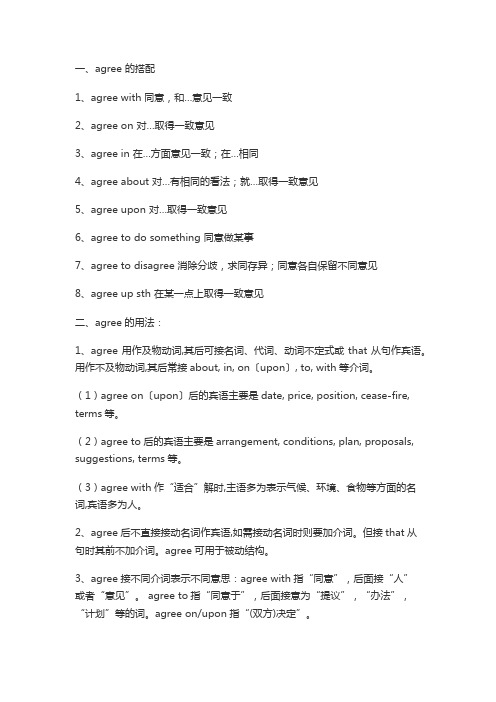
一、agree 的搭配1、agree with 同意,和…意见一致2、agree on 对…取得一致意见3、agree in 在…方面意见一致;在…相同4、agree about 对…有相同的看法;就…取得一致意见5、agree upon 对…取得一致意见6、agree to do something 同意做某事7、agree to disagree 消除分歧,求同存异;同意各自保留不同意见8、agree up sth 在某一点上取得一致意见二、agree的用法:1、agree用作及物动词,其后可接名词、代词、动词不定式或that从句作宾语。
用作不及物动词,其后常接about, in, on〔upon〕, to, with等介词。
(1)agree on〔upon〕后的宾语主要是date, price, position, cease-fire, terms等。
(2)agree to后的宾语主要是arrangement, conditions, plan, proposals, suggestions, terms等。
(3)agree with作“适合”解时,主语多为表示气候、环境、食物等方面的名词,宾语多为人。
2、agree后不直接接动名词作宾语,如需接动名词时则要加介词。
但接that从句时其前不加介词。
agree可用于被动结构。
3、agree接不同介词表示不同意思:agree with指“同意”,后面接“人”或者“意见”。
agree to指“同意于”,后面接意为“提议”,“办法”,“计划”等的词。
agree on/upon指“(双方)决定”。
4、agreed指“互相同意的”,作为不及物动词的过去分词时,可作形容词,后可接that从句。
5、agree也可作为及物动词的过去分词。
agreed to do表示“在别人建议下同意做某事”,而agreed in doing表示“彼此间相互同意做某事”;。
agree的用法总结

agree的用法总结agree表示同意,赞成,下面小编给大家整理了agree的用法总结,希望大家喜欢!agree有哪些意思同意;赞成eg: I didn’t agree with him because I felt he was wrong.我不同意他的说法,因为我觉得他是错的。
(对…)取得一致意见,一致同意eg: They all agreed to take a bus to the train station.他们一致同意坐公交车去汽车站。
应允;答应;同意eg: He asked for a promotion and the manager agreed.他要求升职,经理答应了。
商定;约定eg: The two companies wanted to agree a price through negotiation.这两个公司想要通过协商来商定一个价格。
批准,认可(计划、要求等)eg: His proposal has been agreed at the meeting.他的提案在会上已经获得批准了。
与……相符,与……一致eg: What you said doesn’t agree with her description.你说的和她的描述不一致。
agree的具体用法agree可作及物动词,后面加名词、代词或that 从句。
eg: I agree that your bike is newer than mine.我承认你的自行车比我的新。
agree with后面可以接人,也可以接表示看法、建议、分析、想法等之类的词。
eg: I agree with her.我同意她。
I agree with her analysis.我同意她的分析。
agree to中的to为介词时,后面可以加表示计划、方法、安排的词或者动名词。
当to为小品词时,后面可以接动词原形。
注意没有agree sb. to do sth.的说法。
Agree的用法

Agree的用法agree后面接介词法比较复杂,常见用法有:(1) 涉及讨论的题目用about。
They never agree about politics. 关于政治问题,他们总是意见不一致。
(2)要确定一样事情用on。
Can we agree on a date for the next meeting? 我们能不能为下次会议确定一个时间?(3)涉及一件建议或计划用to。
He’s agreed to our suggestion about the holiday. 他已经同意我们关于假日的计划了。
(4)涉及意思、想法、分析、解释以及涉及人的时候用with。
They might not agree with his opinions. 他们可能不同意他的意见。
(5)agree后可接动词不定式或宾语从句。
We agree to leave at once. 我们同意马上离开。
agree一般常用口语用法(1)I can't argue with you about that. 我无法与您争辩那件事。
(2)Y ou can say that again. 您说的对极了。
(3)You took the words right out of my mouth. 您已说出我心里的话。
(4)I was about to say the same thing. 我正想提出同样看法。
(5)I couldn't agree with you more. 我极表同意您的看法。
注意上列类似用语"I couldn't agree with you more.",按字面翻译为「我无法再更加同意您了」,实则表「我对您极表同意」。
注意这是固定句型,助动词必须用couldn't,而不可用can't。
Each与every都有“每个”的意思,但二者含义及语法功能不同,主要区别是:一、1. ea ch既可用作形容词,又可用作代词,在句中可以作定语,主语、宾语、同位语、状语等。
agree的短语搭配及其用法
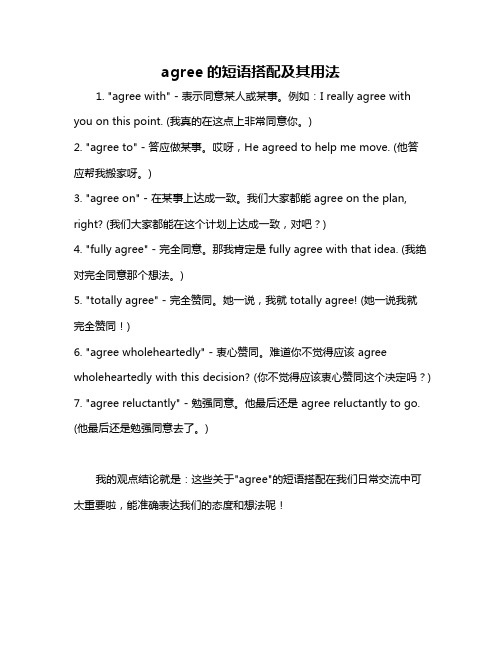
agree的短语搭配及其用法
1. "agree with" - 表示同意某人或某事。
例如:I really agree with you on this point. (我真的在这点上非常同意你。
)
2. "agree to" - 答应做某事。
哎呀,He agreed to help me move. (他答
应帮我搬家呀。
)
3. "agree on" - 在某事上达成一致。
我们大家都能 agree on the plan, right? (我们大家都能在这个计划上达成一致,对吧?)
4. "fully agree" - 完全同意。
那我肯定是 fully agree with that idea. (我绝对完全同意那个想法。
)
5. "totally agree" - 完全赞同。
她一说,我就 totally agree! (她一说我就
完全赞同!)
6. "agree wholeheartedly" - 衷心赞同。
难道你不觉得应该 agree wholeheartedly with this decision? (你不觉得应该衷心赞同这个决定吗?)
7. "agree reluctantly" - 勉强同意。
他最后还是 agree reluctantly to go. (他最后还是勉强同意去了。
)
我的观点结论就是:这些关于"agree"的短语搭配在我们日常交流中可太重要啦,能准确表达我们的态度和想法呢!。
agree的用法及几个重要短语

英语资源频道为⼤家整理的agree的⽤法及⼏个重要短语,供⼤家参考:)1. agree withwith(1) 表⽰同意某⼈或某⼈的意见、想法、分析、解释等 (即持同⼀观点)。
如:I quite agree with you. 我完全同意你的意见。
We a; mso-char-indent-count:2.0; mso-line-height-rulgree with what you say. 我们同意你说的。
(2) 表⽰“(⾷物、天⽓、⼯作等)对……适宜”。
如:The food does not agree with me. 这⾷物对我不适合。
Hard work does not agree with him. 艰苦的⼯作对他不适宜。
(3) 表⽰“与……⼀致”。
如:His story agrees with the facts. 他的陈述与事实相符。
A verb must agree with its subject in person and number. 动词必须和它的主语在⼈称和数⽅⾯保持⼀致。
2. agree to (1) 后接某些名词,表⽰同意或接受某事,尤其指别⼈提出的某事,有时可能是⾃⼰不喜欢的事。
He agree the plan (the date). 他同意了这个计划(⽇期)。
We agreed to their arrangement. 我们同意了他们的安排。
I was forced to agree to it, but at heart I didn’t quite agree with it. 我被迫答应,但内⼼并不完全同意。
(2) 后接动词原形(此时to是不定式符号)或动名词(⼀般有逻辑主语,此时 to 是介词)。
如:We agreed to leave early. 我们同意早点出发。
She agreed to my going home. 她同意我回去。
注:英语不说 agree sb to do sth。
agree的用法(几个重要短语)
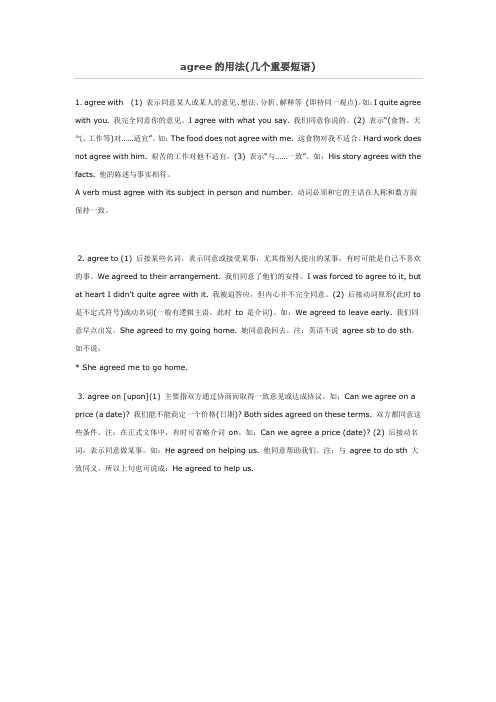
agree的用法(几个重要短语)1. agree with (1) 表示同意某人或某人的意见、想法、分析、解释等(即持同一观点)。
如:I quite agree with you. 我完全同意你的意见。
I agree with what you say. 我们同意你说的。
(2) 表示“(食物、天气、工作等)对……适宜”。
如:The food does not agree with me. 这食物对我不适合。
Hard work does not agree with him. 艰苦的工作对他不适宜。
(3) 表示“与……一致”。
如:His story agrees with the facts. 他的陈述与事实相符。
A verb must agree with its subject in person and number. 动词必须和它的主语在人称和数方面保持一致。
2. agree to (1) 后接某些名词,表示同意或接受某事,尤其指别人提出的某事,有时可能是自己不喜欢的事。
We agreed to their arrangement. 我们同意了他们的安排。
I was forced to agree to it, but at heart I didn’t quite agree with it. 我被迫答应,但内心并不完全同意。
(2) 后接动词原形(此时to 是不定式符号)或动名词(一般有逻辑主语,此时to 是介词)。
如:We agreed to leave early. 我们同意早点出发。
She agreed to my going home. 她同意我回去。
注:英语不说agree sb to do sth。
如不说:* She agreed me to go home.3. agree on [upon](1) 主要指双方通过协商而取得一致意见或达成协议。
如:Can we agree on a price (a date)? 我们能不能商定一个价格(日期)? Both sides agreed on these terms. 双方都同意这些条件。
初中英语小词大搭配:agree用法解析

【导语】以下是⽆忧考整理的《初中英语⼩词⼤搭配:agree⽤法解析》,⼀起来看看吧!Agree是英语中较为常见的单词,表⽰V.同意/赞成,常做不及物动词,⼀起来看看它不同的⽤法!⾸先,agree可以表⽰赞同的意思,同时也有承认的意思。
如下⾯例句:Wet agree on your plans.我们同意你的计划。
The boy agrees that Tom is cleverer than him.这个男孩承认汤姆⽐他聪明得多。
agree做不及物动词时,可搭配介词to ,with,upon,on等,但含义却有所不同。
1.agree with可接某⼈,或者具体的建议看法的词,表⽰同意某⼈或某⼈的想法、分析、意见等。
例如:I agree with you.我同意你。
I agree with your suggestion.我同意你的建议。
2.agree to后⼀般接具体的表⽰计划,⽅法,安排的词。
也可接动词原形或动名词。
同时,要注意) agree不能接不定式的复合结构,即表达“同意某⼈做某事”时不可以⽤ agree sb to do sth,⽽应根据情况改⽤agree to do或agree to +动名词的结构。
We don't agree to this arrangement.我们不赞同这个安排。
I agree to work tomorrow.我同意明天开始⼯作。
3.agree on 表⽰在某事⽅⾯(可为具体的事:如条款,价格等)达成⼀致,也可接动名词相当于agree to do.We’re not going to agree on every issue.我们不会在每⼀个问题上都持⼀致看法。
He agreed on attending (=to attend)the meeting .他同意参加那个会议。
agree用法详解

agree用法详解agree with 和agree to都表示“同意;赞同”的意思,但后面所接的宾语不同。
agree with后接指人或表示意见、看法的词;agree to 后接表示建议、计划、安排之类的词。
例如:I quite agree with you. 我很同意你(的意见)。
Do you agree with what I have said? 你赞同我所说的话吗?He has agreed to our suggestion about the holiday. 他已经同意我们度假的建议了。
agree with/ agree to/ agree onagree with, agree to和agree on都表示“同意”,但用法不同。
◎agree with表示“同意”,后面接表示人的名词或代词,也可以接表示“意见,看法”的名词。
We all agree with him. 我们都同意他的意见。
Do you agree with my ideas? 你同意我的观点吗?◎agree to表示“同意”,后面接表示“计划,建议,安排”等的名词,接动词原形时构成动词不定式结构。
He agreed to our plan at last. 最后他同意了我们的计划。
They agreed to come on Monday. 他们同意星期一来。
◎agree on表示“(两人以上)就……取得一致意见,在……方面意见一致”,其主语多为复数形式,宾语是表示事、计划等的名词,而不是表示人的名词或代词,它可以与agree in doing sth替换。
表示经过协商,讨论或谈判而就某事双方取得了一致意见用on. They agreed on the plan.=They agreed in doing the plan. 他们对这个计划意见一致。
We agreed on leaving for Beijing the next day.Why can they never agree on something?◎ agree about sth 涉及讨论的题目They never agree about politics.They all agree about that.特别提示agree with也可以表示“某人适应(食物、气候等)”。
agree是什么意思及介词搭配用法

agree是什么意思及介词搭配用法agree的基本含义一、不及物动词vi.1、(对提议、计划、条件等)表示同意,赞成(to); (对意见等)表示赞同(with):例句:I cannot agree with your opinions.我不能同意你的观点。
Do you agree to the conditions?你同意这些条件吗?2、(意见)相同,(与某人)持相同意见,持一致看法(with):例句:I agree with him.我的意见和他的相同。
3、(就价钱、条件等)达成协议,商定 (about, on, upon):例句:They have agreed on the terms of surrender.他们就投降条件达成了协议。
The two groups agreed on a cease-fire.两派达成了停火协议。
4、表示愿意,应允,答应:例句:I agree to leave at once.我答应即刻离开。
5、(性情等)投合;相符,相同,一致(with):例句:This story agrees with his.这个叙述与他的叙述一致。
6、和睦相处:例句:They can'tagree well.他们无法和睦相处。
7、(食物、气候等)相宜,适宜,适合(with):例句:The food did not agree with her.这种食物不合她的胃口。
The climate agrees with me fairly well.这气候对我非常适宜。
二、及物动词vt.1、造成,同意;承认[后接名词从句]:例句:I agree that she is the ablest of us.我承认她是我们之中最能干的一个。
2、对…达成协议,就…取得一致意见;对(提议、计划、条件等)表示同意;对(意见等)表示赞同:例句:I must agree your plans.我应该赞成你的计划。
agree用法
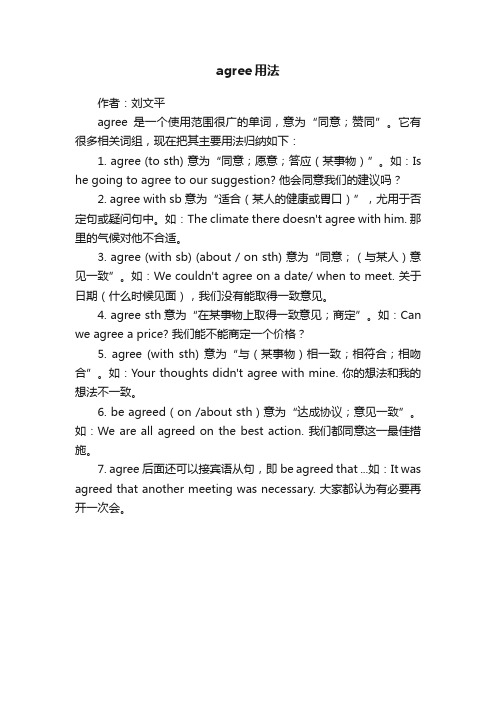
agree用法作者:刘文平agree是一个使用范围很广的单词,意为“同意;赞同”。
它有很多相关词组,现在把其主要用法归纳如下:1. agree (to sth) 意为“同意;愿意;答应(某事物)”。
如:Is he going to agree to our suggestion? 他会同意我们的建议吗?2. agree with sb 意为“适合(某人的健康或胃口)”,尤用于否定句或疑问句中。
如:The climate there doesn't agree with him. 那里的气候对他不合适。
3. agree (with sb) (about / on sth) 意为“同意;(与某人)意见一致”。
如:We couldn't agree on a date/ when to meet. 关于日期(什么时候见面),我们没有能取得一致意见。
4. agree sth意为“在某事物上取得一致意见;商定”。
如:Can we agree a price? 我们能不能商定一个价格?5. agree (with sth) 意为“与(某事物)相一致;相符合;相吻合”。
如:Your thoughts didn't agree with mine. 你的想法和我的想法不一致。
6. be agreed(on /about sth)意为“达成协议;意见一致”。
如:We are all agreed on the best action. 我们都同意这一最佳措施。
7. agree后面还可以接宾语从句,即be agreed that ...如:It was agreed that another meeting was necessary. 大家都认为有必要再开一次会。
短语词汇agree的用法
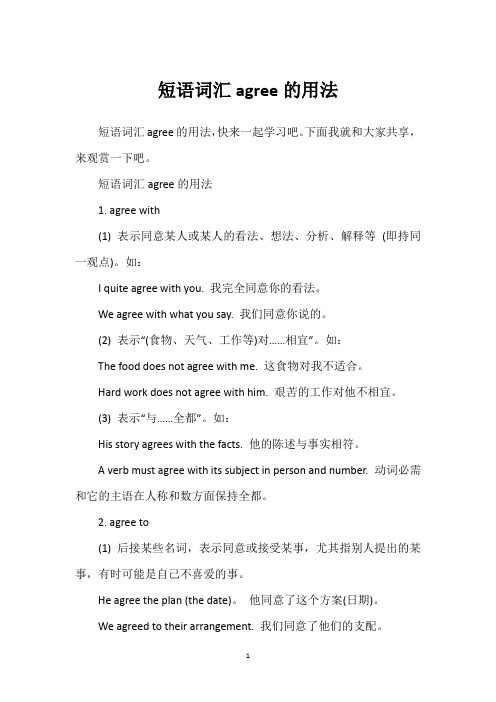
短语词汇agree的用法短语词汇agree的用法,快来一起学习吧。
下面我就和大家共享,来观赏一下吧。
短语词汇agree的用法1. agree with(1) 表示同意某人或某人的看法、想法、分析、解释等(即持同一观点)。
如:I quite agree with you. 我完全同意你的看法。
We agree with what you say. 我们同意你说的。
(2) 表示“(食物、天气、工作等)对……相宜”。
如:The food does not agree with me. 这食物对我不适合。
Hard work does not agree with him. 艰苦的工作对他不相宜。
(3) 表示“与……全都”。
如:His story agrees with the facts. 他的陈述与事实相符。
A verb must agree with its subject in person and number. 动词必需和它的主语在人称和数方面保持全都。
2. agree to(1) 后接某些名词,表示同意或接受某事,尤其指别人提出的某事,有时可能是自己不喜爱的事。
He agree the plan (the date)。
他同意了这个方案(日期)。
We agreed to their arrangement. 我们同意了他们的支配。
I was forced to agree to it,but at heart I didn’t quite agree with it. 我.应,但内心并不完全同意。
(2) 后接动词原形(此时to是不定式符号)或动名词(一般有规律主语,此时to 是介词)。
如:We agreed to leave early. 我们同意早点动身。
She agreed to my going home. 她同意我回去。
注:英语不说agree sb to do sth.如不说:.She agreed me to go home.3. agree on [upon](1) 主要指双方通过协商而取得全都看法或达成协议。
agree的用法

Agree的用法agreev. 同意,赞成I agree with you.我同意你(的意见)。
I couldn’t agree more.我非常同意。
这个单词非常重要!总结下agree的所有重要句型。
第一王牌句型:agree + to + sth.(一般用于同意某提议或建议)☆ Is he going to agree to our suggestion?他会同意我们的意见吗?☆ He agreed to my idea.他接受了我的意见。
☆ She can’t agree to your demands.她不可能接受你的要求。
☆ I find it impossible to agree to your terms.我认为不可能接受你们的条件。
【商业谈判常用精品句!】Kim’s Note: During business negotiations, you may sometimes be tempted to yell out, “No way!” Try using this more difficult, but effective sentence instead.在生意谈判中,你可能经常想大喊:“没门!” 下一次试试用这句难一点但却更有效的句子。
第二王牌句型:agree + to do sth.☆ Tom agreed to do the work.汤姆答应做这件工作。
☆ My friends agreed to lend me the money.我的朋友们答应借钱给我。
第三王牌句型:agree + with + sb. (+ about/on + sth.)☆ Do you agree with him about/on that matter?关于那件事,你同意他的意见吗?第四王牌句型:agree + with + sth.☆ I don’t agree with a single word that you have said.你说的话我一个字都不赞成。
- 1、下载文档前请自行甄别文档内容的完整性,平台不提供额外的编辑、内容补充、找答案等附加服务。
- 2、"仅部分预览"的文档,不可在线预览部分如存在完整性等问题,可反馈申请退款(可完整预览的文档不适用该条件!)。
- 3、如文档侵犯您的权益,请联系客服反馈,我们会尽快为您处理(人工客服工作时间:9:00-18:30)。
agree 不及物动词,不能接宾语,反义词:disagree
如:You say you don’t believe him, and that’s where I disagree. A. what B. where C. because D. how
1. agree with ①表示同意某人或某人的意见、想法、分析、解释等(即持同一观点):
I don’t agree with you.They agreed with this idea. I agree with what you said.
②表示“ (食物、天气、工作等)对…适宜”:
The weather does not agree with me. Hard work does not agree with him.
③表示“与…一致”:What he does not agree with what he says.
2. agree to ①主要用来表示一方提出一项建议、安排、计划等,另一方同意协作:
We agreed to their arrangement. She agreed to marriage.
有时agree to 也可用来表示“答应”一件自己不愿做的事:
I was forced to agree to it, but at heart I didn’t quite agree with it.
②后接suggestion, plan, proposal 等名词时,与accept 同义:
Do you think he will agree to (=accept) my suggestion? 你认为他会同意(接受)我的建议吗?
③其后既可接动词原形(此时to是不定式符号),也可接动名词(一般有逻辑主语,此时to是介词):
He agreed to go with us. I never agreed to Mary marrying him.
3. agree on [upon]
①主要指双方通过协商而取得一致意见或达成协议:
We agreed on the price. 我们就价格达成了一致意见。
Both sides agreed on these terms. 双方都同意这些条件。
②后接动名词(=agree to do sth):
He agreed on lending (=to lend) us some money. Mary agreed on coming [to come] on Monday.
4. 两点用法说明:
(1) 后接表示人的名词或代词时,一般只用agree with。
(2) agree 不能接不定式的复合结构,所以汉语的“同意某人做某事”,不能直译为agree sb to do sth, 而应根据情况改用其它结构:他们同意我去。
正:They agreed to let me go. 正:They agreed to my going.
agree 不及物动词,不能接宾语,反义词:disagree
如:You say you don’t believe him, and that’s where I disagree. A. what B. where C. because D. how
1. agree with ①表示同意某人或某人的意见、想法、分析、解释等(即持同一观点):
I don’t agree with you.They agreed with this idea. I agree with what you said.
②表示“ (食物、天气、工作等)对…适宜”:
The weather doesnot agree with me. Hard work does not agree with him.
③表示“与…一致”:What he does does not agree with what he says.
2. agree to ①主要用来表示一方提出一项建议、安排、计划等,另一方同意协作:
We agreed to their arrangement. She agreed to marriage.
有时agree to 也可用来表示“答应”一件自己不愿做的事:
I was forced to agree to it, but at heart I didn’t quite agreewith it.
②后接suggestion, plan, proposal 等名词时,与accept 同义:
Do you think he will agree to (=accept) my suggestion? 你认为他会同意(接受)我的建议吗?
③其后既可接动词原形(此时to是不定式符号),也可接动名词(一般有逻辑主语,此时to是介词):
He agreed to go with us. I never agreed to Mary marrying him.
3. agree on [upon]
①主要指双方通过协商而取得一致意见或达成协议:
We agreed on the price. 我们就价格达成了一致意见。
Both sides agreed on these terms. 双方都同意这些条件。
②后接动名词(=agree to do sth):
He agreed on lending (=to lend) us some money. Mary agreed on coming [to come] on Monday.
4. 两点用法说明:
(1) 后接表示人的名词或代词时,一般只用agree with。
(2) agree 不能接不定式的复合结构,所以汉语的“同意某人做某事”,不能直译为agree sb to do sth, 而应根据情况改用其它结构:他们同意我去。
正:They agreed to let me go. 正:They agreed to my going.。
